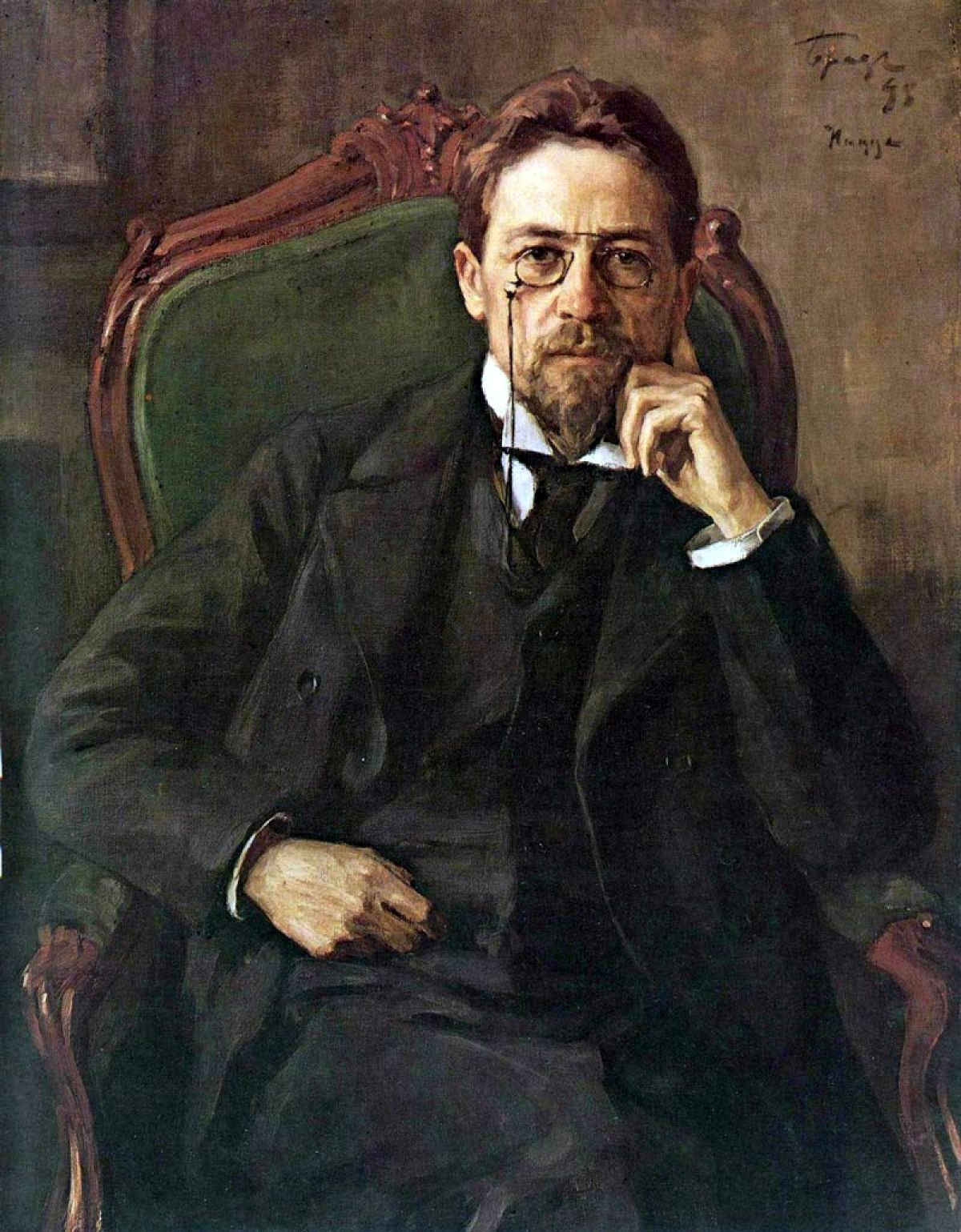I have come to appreciate Anton Chekhov’s stories more as I move deeper into middle age. Chekhov’s fiction explores the quiet drama in the lives of ordinary people, and the prolific Russian author often concludes his stories without much of a clear-cut resolution, something I found off-putting when I was younger but now, with the benefit of life-experience, recognize as closer to reality than the tidy and clever concluding epiphanies offered by more conventional writers.

Chekhov is fascinated by people, by their contradictory behavior, by their elusive inner lives, and their capacity for cruelty, and pettiness, and, yes, love. There’s little in the way of enveloping action in Chekhov’s fiction—few Tolstoyian connections to the political and social issues of the day—but his characters are universally human in a way that transcends the 19th century bourgeois Russian setting.
Chekhov approaches his characters with a slightly ironic empathy—the legacy, no doubt, of his years as a physician—and with few illusions. That’s evident in his much-anthologized “The Lady with the Pet Dog,” where we learn of the flaws of the two main characters, an adulterous couple, as Chekhov introduces them in the first few pages of the story. (That Chekhov narrows his focus to the couple is deliberate; he once wrote: “Let two people be the center of gravity in your story: he and she.”)
A flawed couple
Dimitry Dmitrich Gurov is a Moscow banker, trapped in a loveless marriage (he is, Chekhov tells us, somewhat afraid of his severe and forbidding wife); the story traces his seduction of a young married woman while they are both vacationing in the seaside resort Yalta. His conquest, Anna Sergeyevna, has been raised in St. Petersburg but now lives in a remote provincial city with her husband, a government official she describes as “a flunkey.” Her vacation is a break from her stifling marriage; she is vulnerable, alone except for her white Pomeranian (the pet dog of the story’s title). Gurov is not, at first, a sympathetic character—Chekhov describes him as having a “coarse arrogance,” and Gurov treats women with a mixture of calculated charm and disdain.
Gurov admires Anna Sergeyevna’s “slim delicate throat, her lovely gray eyes” but beyond the sexual attraction, this jaded Moscuvite isn’t particularly impressed by his younger lover (” ‘There’s something pathetic about her, though,’ he thought…”); later we learn he is quickly “bored with her” and “irritated by her naive tone.” Anna Sergeyevna seems starved for attention and love, although she is guilty and anxious about their affair; it is easier to sympathize with her neediness than with Gurov’s selfish vanity.
And there, you might think, it would end: a brief dalliance far from home, a liaison carrying more significance for the naive Anna Sergeyevna than for the worldly Gurov. Yet that is not what happens. When Gurov returns to his daily routine he finds that rather than fading from memory, Anna Sergeyevna remains more and more on his mind (“And his memories glowed more and more vividly.”)
He has been somehow touched deeply by his connection with this fair-haired young woman; when he tries to verbalize his feelings, however, he finds he is blocked both by convention and by the emotional tone-deafness of those around him. There is a tragi-comic moment when he broaches the subject of Anna Sergeyevna and finds a friend more concerned with the freshness of the fish being served at their club than with hearing about Gurov’s “fascinating woman.”
Gurov, now obsessed, decides that he must see Anna Sergeyevna again, and so he concocts an excuse and heads off to her drab, provincial city. He attends the opening night at the local theater, hoping to see her, and he is in luck; she is there, with her husband, seated in the third row.
…when Gurov looked at her his heart contracted, and he understood clearly that in the whole world there was no human being so neat, so precious, and so important to him; she, this little undistinguished woman, lost in a provincial crowd, with a vulgar lorgnette in her hand, filled his whole life now, was his sorrow and his joy, the only happiness he now desired for himself, and to the sounds of the bad orchestra, of the miserable local violins, he thought how lovely she was. He thought and dreamed.
The passage captures Chekhov’s clinically ironic approach as a writer. Gurov’s sudden awareness of his romantic love for Anna, is balanced with the reality that she is a “little undistinguished woman” with a “vulgar lorgnette”; and this moment of passion has a musical accompaniment of “miserable local violins.”
“The Lady with the Pet Dog” does not end with this dramatic reunion; instead, Chekhov describes the continuation of the affair, as Anna Sergeyevna visits Gurov in Moscow and their relationship and secret life together becomes “…everything that constituted the core of his life.” Doctor Chekhov is sensitive to the contrast between the external and internal—what is truly going on with a person (their health, their feelings, their desires and needs), he suggests, is hidden from public view.
What will happen to the lovers? Chekhov does not tell us directly but hints that, while “the end is still far off,” there will be no conventional happy ending—that there are complications and difficulties ahead. It is a mark of Chekhov’s artistry that, by the end of “The Lady with the Pet Dog,” we very much want to know how it turns out for Gurov and Anna Sergeyevna, ordinary people with an extraordinary love.
Excerpts from Avrahm Yarmolinsky’s translation of “The Lady with the Pet Dog.”
Copyright © 2007 Jefferson Flanders
All rights reserved
Jefferson Flanders is author of the Cold War thriller Herald Square.